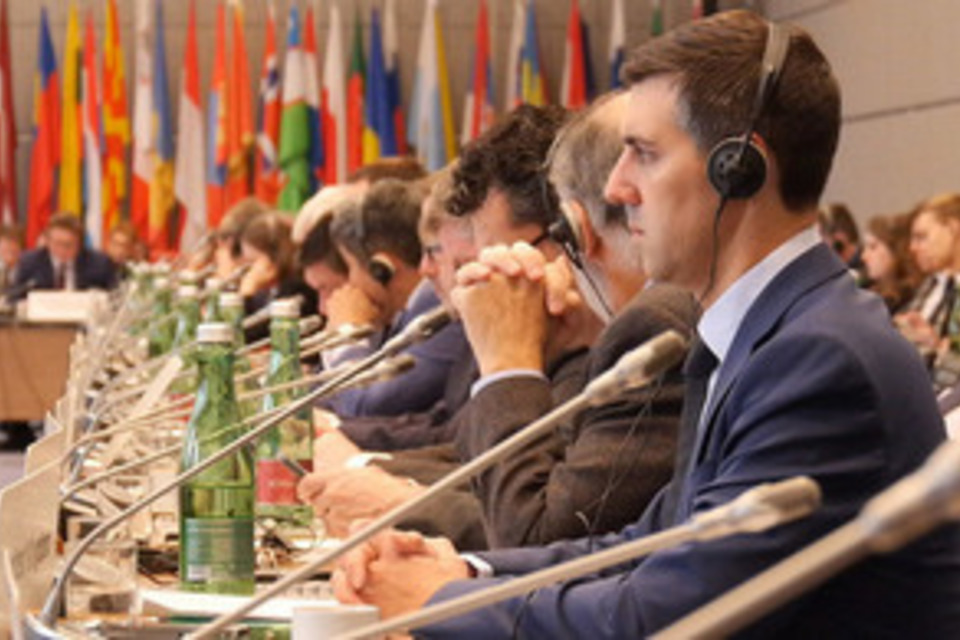Russian aggression against Ukraine: UK response to OSCE
Ambassador Neil Bush responds to Ambassadors Çevik and Grau and discusses OSCE’s efforts in response to Russia’s ongoing aggression against Ukraine.

Thank you Madam Chairperson. Ambassador Çevik, Ambassador Grau we are grateful for your reports today and all your efforts towards a peaceful and sustainable resolution of the conflict.
The UK still has significant concerns about the heightened tensions caused by the increased Russian military activity on Ukraine’s border and in illegally annexed Crimea in April. We continue to call on Russia to engage with the OSCE processes and mechanisms available to provide necessary transparency regarding this activity.
Ambassador Çevik, the Special Monitoring Mission’s impartial, facts-based reporting remains crucial. Your written report outlined that the SMM recorded over 20,900 ceasefire violations between 21 March and 6 June – an almost threefold increase compared with the previous reporting period. While the average number of ceasefire violations recorded remains below those seen prior to July 2020, the UK is concerned by this overall upward trajectory.
We are particularly alarmed that the SMM recorded 150 instances of the use of weapons that should have been withdrawn under the Minsk agreements, compared with two instances in the last reporting period. It is noteworthy that of the 670 weapons observed by the Mission in violation of their respective withdrawal lines, 87 per cent were in non-government controlled areas.
Given the SMM’s vital role, we condemn ongoing impediments to the Mission’s monitoring through the targeting of its equipment. During the reporting period, the instances of GPS signal interference encountered by the SMM UAVs, assessed as caused by jamming, increased almost four-fold, with 43 per cent of all UAV flights experiencing signal interference.
The SMM also continues to face systematic restrictions on its freedom of movement in non-government controlled areas, where 82 per cent of restrictions occurred. It is unacceptable that COVID-19 continues to be used as a pretext to impose restrictions, particularly given the numerous measures the mission has taken. We commend the SMM on its vaccination programme and Poland for its contribution.
We urge Russia to use its undeniable influence over the armed formations it backs to ensure SMM monitors and equipment have safe, unconditional and unimpeded access throughout Ukraine, including in Crimea and areas near the Ukraine-Russia state border.
Sadly, civilians also continue to face restrictions on their freedom of movement. Your report outlines that the partial closure of crossing points - now for 15 months - has severely restricted civilians’ ability to cross the line of contact.
Ambassador Grau, we are grateful to you and your team for your ongoing efforts to make progress on the opening of new checkpoints at Zolote and Shchastia. We note that these checkpoints have now been open for nearly 8 months on the government-controlled side. It is unacceptable that Russia and the armed formations it backs continues to keep them closed on their side.
Women have been particularly affected by these closures. Ambassador Çevik, we welcome the inclusion in your report of the SMM’s findings from its interviews with over 150 women living near the line of contact. The concerns raised ranged from economic difficulties, to security risks stemming from shelling and the presence of mines and unexploded ordnance.
Tragically, the SMM has corroborated 14 civilian casualties occurring due to mines, unexploded ordnance and other explosive devices in April alone. Ambassador Grau, we commend you and your team for your efforts to make progress on plans agreed in the Trilateral Contact Group for demining in 19 locations and for 4 new disengagement areas. If implemented, these plans would greatly improve the lives of civilians living in conflict-affected areas. We call on Russia to match the political will shown by Ukraine, so that progress can be made.
I would like to thank Ambassadors Frisch and Morel for their work in the Trilateral Contact Group, and to congratulate Ambassador Bermann and Relander on their appointments. They have the UK’s full support. Finally, Ambassador Grau, I would like to pass on the UK’s immense gratitude to you. The professionalism, dedication and patience you have demonstrated have been exemplary and will be sorely missed. We wish you all the very best in your future endeavours.
Madam Chair, we reiterate our support for the Minsk agreements to deliver a peaceful resolution to the conflict in full respect of Ukraine’s sovereignty and territorial integrity, and the work of the Trilateral Contact Group and the Normandy Four in this regard. We call on Russia to withdraw its military personnel and weapons from the territory of Ukraine and cease its support for the armed formations it backs.
The UK strongly supports Ukraine’s sovereignty and territorial integrity within its internationally recognised borders, including its territorial waters. We do not and will not recognise Russia’s illegal annexation of Crimea. The UK has consistently stood with Ukraine in opposing all instances of Russian aggression towards Ukraine and we will continue to do so, including through sanctions, together with our international partners.